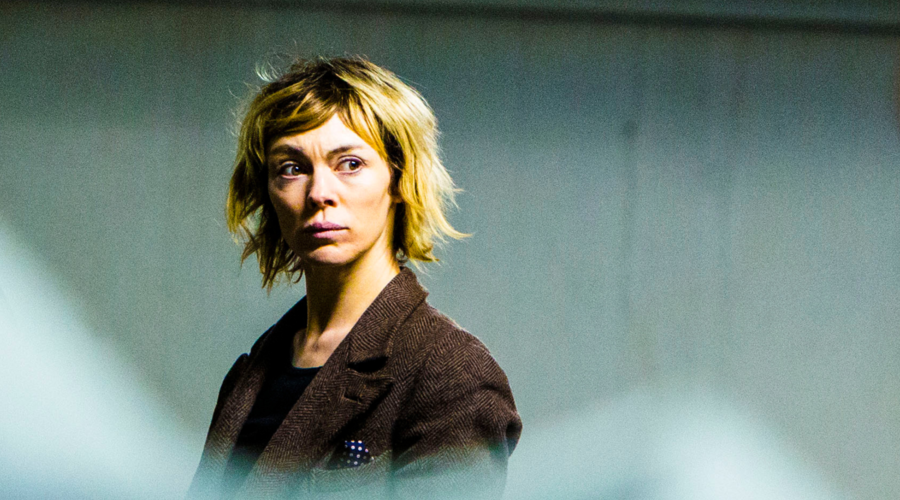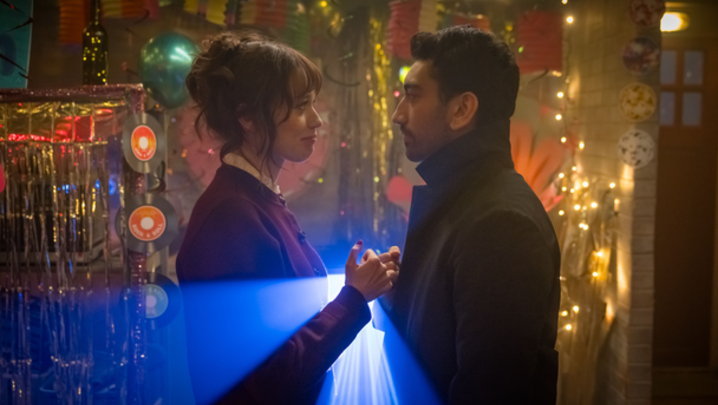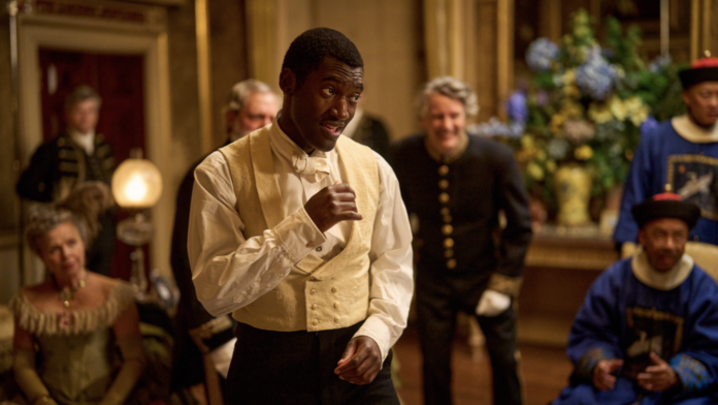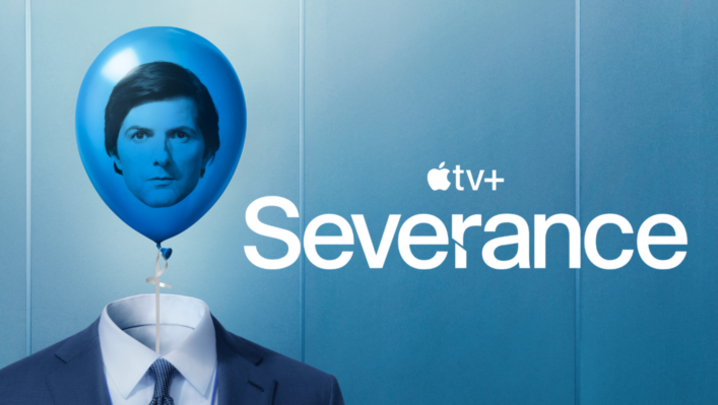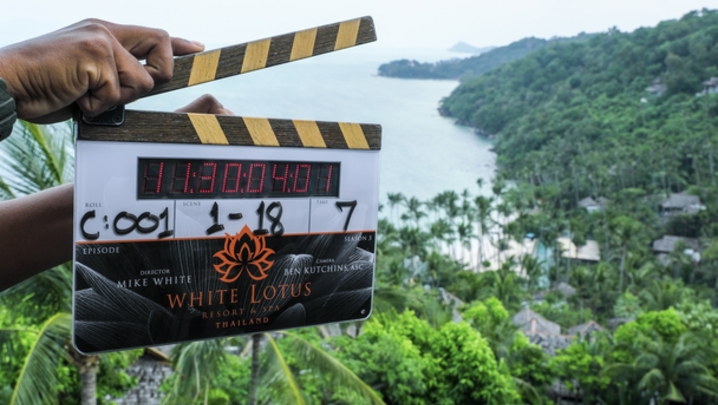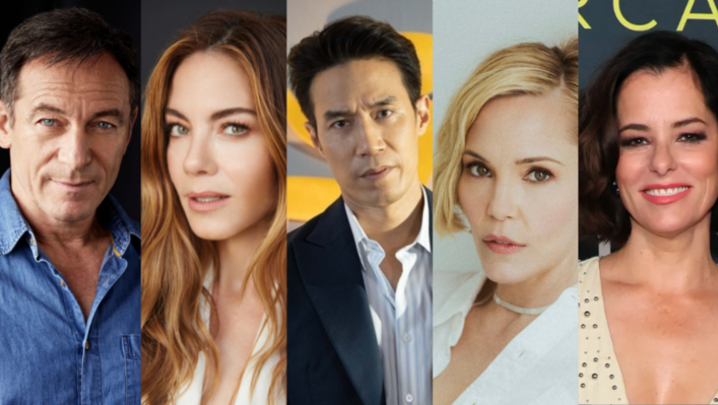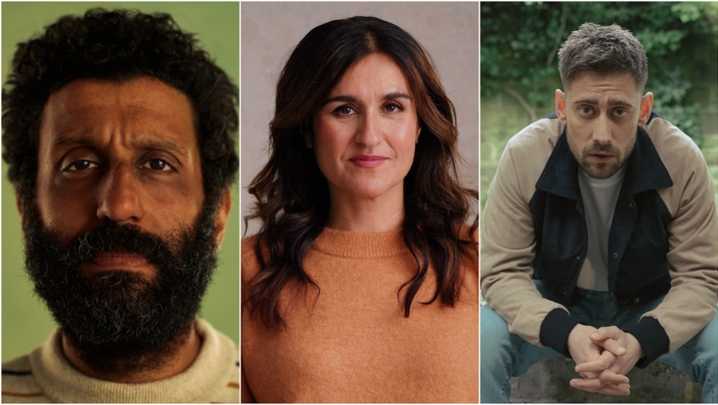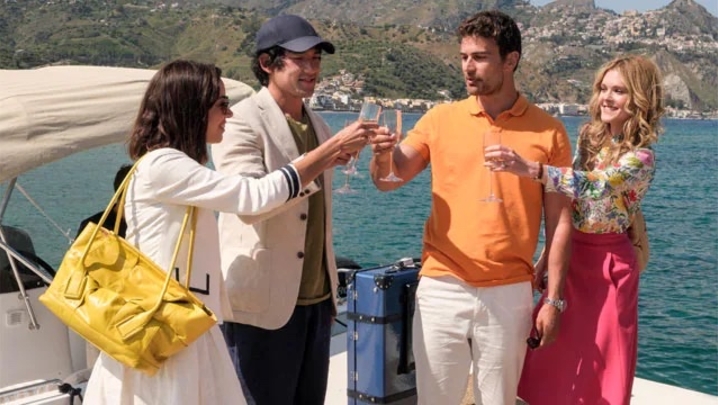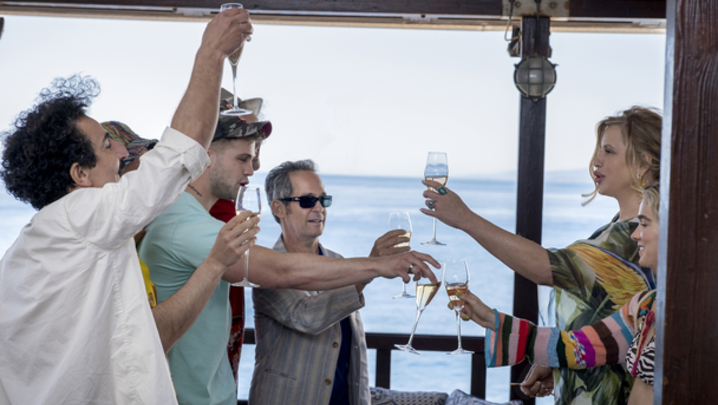Some shows need a series or two before they get going. It takes Utopia 57 seconds.
Less than a minute into the first episode, a man is dead before he hits the floor. His assailant steps around the body, in time for a colleague to ask a terrified comic book shop worker:
“Where is Jessica Hyde?”
A lethal game of cat and mouse ensues when the Network – a shadowy organisation hellbent on decreasing Earth’s population – begin to hunt down the ordinary people in their way.
The 2013-14 thriller, which aired for just two series on Channel 4, remains one of the most distinctive shows ever made. The colours are loud. The music is like an anxiety attack you can dance to. It’s funny. You have also, most likely, never heard of it.
Like the show itself, the writing process began with a simple query.
“At the time, we were coming up to seven billion on the planet, and it just seemed to me that no-one was talking about this,” the show’s main writer, Dennis Kelly, explains. “We were all talking about the environment, but no-one was talking about the fact that every single human is a massive, massive creator of carbon.”
“It was a question I didn’t have an answer to.”
The solution the Network come up with is to spread ‘Russian flu’ and use their extensive government connections to distribute a vaccine. Unbeknownst to those who take it, the vaccine will sterilise all but a sliver of the population. Along the way, the Network are happy to kill journalists, politicians and even children to keep their plan under wraps.
When Kelly was brought onboard, the show was being developed for Sky, alongside another series. The two were meant to loosely connect, and be made by different production companies, with different showrunners.
“Which is a really stupid idea when I look back, because it’s hard enough to make one series that works,” Kelly says.
Kudos were responsible for what would become Utopia. Kelly was recruited by the production company’s then-CEO, Jane Featherstone. Over a decade on, details are hazy, but he recalls that the companion show revolved around the 1960s and 1970s hippie scene.
“I wasn’t really interested in morality mind control. To my mind, [population control] felt a bit more morally difficult”
“It was much more fleshed out than mine. [The idea for] my series was really just a paragraph or two: it was about a conspiracy hidden in a graphic novel. That was the thing I liked. Everything else wasn’t to my taste. The conspiracy was [originally] much more comic book: I think it was about doing something to people’s minds that would make them good or bad.”
“I wasn’t really interested in morality mind control. To my mind, [population control] felt a bit more morally difficult,” Kelly explains.
Initially, not everyone shared Kelly’s vision.
“Sky saw these two series and just said ‘no’, which was not an unreasonable thing to do, because I don’t know whether [the shows] were working together well,” he says. “Jane at Kudos was really interested in what was going to be Utopia, so she just bought it back from Sky and said ‘we’re taking it elsewhere’.”
As Kelly remembers it, Jessica Hyde, a principal character in Utopia played to ethereal perfection by Fiona O’Shaughnessy, started off connected to the sister series. Initially planned to be the daughter of a character from the show exploring the hippie scene, the rest of this ‘prototype Jessica’ was a mystery.
By the time the scripts were finished, she had become a woman who’d spent her life on the run from the Network. She relies on years of cold-blooded instinct in rallying together the everyday folk caught in the Network’s web. Among them are conspiracy theorist Wilson Wilson (Adeel Akhtar), IT consultant Ian (Nathan Stewart-Jarrett), postgrad Becky (Alexandra Roach) and pre-teen Grant (Oliver Woollford). Also in the mix is Michael Dugdale (Paul Higgins), a hapless civil servant who accidentally finds himself of central importance to the Network’s plans.
Utopia found a home at Channel 4, and Marc Munden was brought on as director. He started as he meant to go on, by making a decision that was highly unorthodox for TV.
“We rehearsed,” Neil Maskell, who played Network foot soldier Arby, delights in telling me. “That’s something you never do really.”
“[Marc] likes to rehearse everything,” says Paul Higgins, the actor behind civil servant Michael. “You know, just get a church hall or whatever for two weeks and get everyone in.”
“It’s just a way of actors being able to take risks and do things that they wouldn’t normally do on set, and fail in some cases, and then pick themselves up and do something else,” Munden says.
The person obsessed with finding Jessica in the show’s first scene is Arby, conditioned from birth – we later learn – to kill. Maskell is best known for his tough guy roles, and though Arby is ruthless, he’s also completely devoid of machismo, or indeed any emotion. To Maskell’s mind, the henchman was a trauma survivor, rather than a gangster.
Maskell was able to convey this in the performance thanks to the rehearsal process. It was there that he could present his research into child soldiers and victims of human experimentation. That went onto inform key ticks of Arby’s, like his flat-footed waddle and laboured breathing.
“[Dugdale] felt more like a character from Ibsen than from most of the television I was seeing at the time”
He wasn’t the only one inspired by the Utopia scripts.
“There were probably other actors around at the time who wouldn’t have wanted to be someone as weak as Dugdale,” says Higgins. “But on the other hand, when pushed, he found this courage in himself. That feels more like a character from Ibsen [the 19th century playwright renowned for realism] than from most of the television I was seeing at the time.”
“I can’t write a hero,” Kelly says. “I like the messiness of reality. The first time we see Grant, he’s picking up dogshit just to fuck with someone else. The psychology of that just gets in my head.”
The only thing as messy as the show’s characters is its colour palette. Marc explained to WIRED in 2014 that the visual style takes its cues from the Technicolor look popular in 1950s Hollywood. The world of Utopia is made up of yellows, cyans and magentas, rather than the reds, greens and blues popular in modern filmmaking. A similar approach is used in spot colour printing, which gives old comic books their distinctive appearance. On-screen, it creates the impression that something is indescribably off.
It was yellow that was used to promote the first series, inspired by just one line in the pilot script. Arby’s colleague and partner in (literal) crime Lee, played by Paul Ready, carries a distinctively coloured bag. Munden decided he wanted it as big as possible, settling on a scuba diving bag with the decals removed. It was soon discovered, to Munden’s delight, that the handles would flop down to form a grotesque almost-smiley face.
“There were lots of happy accidents on Utopia,” he recalls. “That yellow bag became a sort of jumping off point for the rest of the colour palette.”
“I wrote one stage direction about a yellow bag, and the next thing I know there’s all this fucking yellow everywhere,” Kelly concurs. “It was brilliant.”
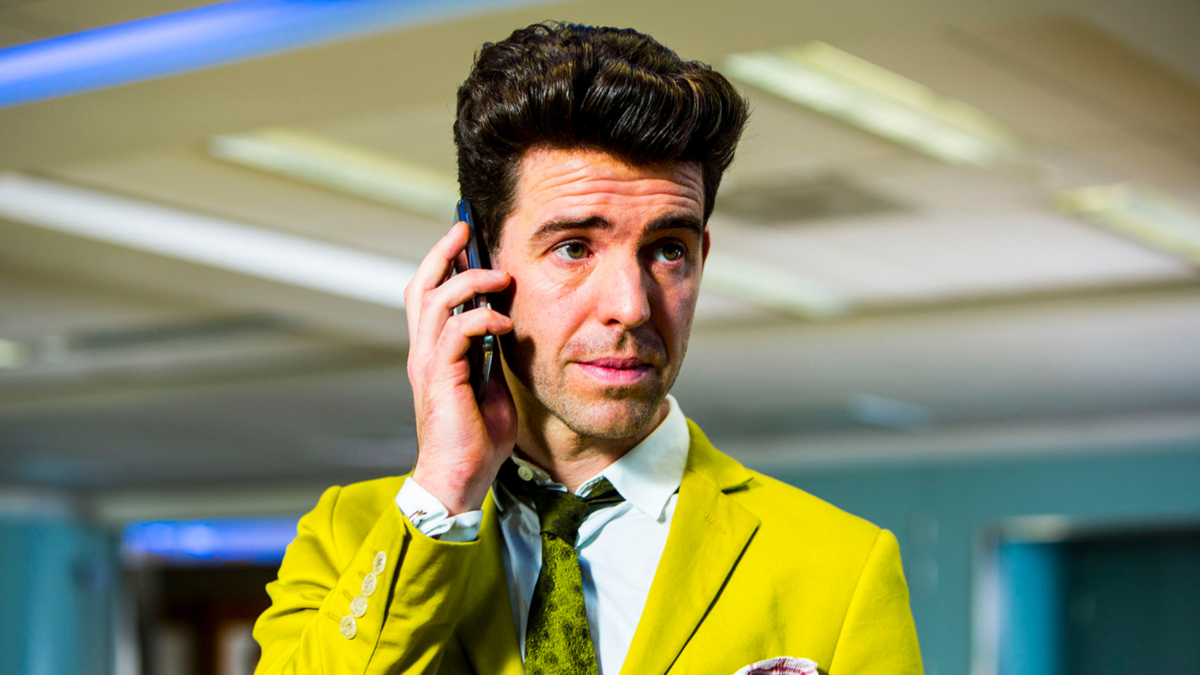
Labours of love like Utopia are often assumed to be the product of a single, domineering auteur, but Kelly and Munden were very happy collaborating.
“The real key to creative work is to lose the arguments that you should lose and win the arguments that you should win,” Kelly explains. “I’ve been saved from myself many times by losing the argument.”
Take the score. The story behind Utopia’s soundtrack begins in 1973 Chile, with Pinochet consolidating power after a bloody coup d’état. The political suppression has inspired countless artists in South America, among them future composer Cristobal Tapia de Veer, who was born the month after the coup.
“Right into it,” he laughs over Zoom.
The way to make sense of a country in turmoil, de Veer learned, is humour.
“We would certainly be cancelled many times for the kind of language we would use in Chile. There were jokes about people being tortured,” he says.
“Utopia had all of that: people get tortured, but you’re laughing at the same time, because it’s so weird. All that stuff really resonated with me.”
After a few months working on the score, de Veer decided to put a Brazilian beat over a scene where a blind Wilson Wilson is trying to shoot at Lee.
“I didn’t think Marc would like that, but when I showed it to him, he was dancing around watching the scene, and he was really into it,” he says. It was at that moment “where we had the sound appear for the whole show,” de Veer adds.
“[Munden] was always pushing for the eccentricity. If I sent a bunch of ideas, he would pick the most eccentric, and he would push me to go even more into that direction.”
It’s hard to describe exactly where that direction ended up. As bouncy as it is, the score also manages to creak with panic and dread.
The human voice plays a big part. Even when the score threatens to drift into familiar action movie territory, a well-timed moan or gasp will worm its way in and stop you getting too comfortable.
The voices are edited just enough to unsettle, but not so much that we stop recognising them as human. In that way, the soundtrack triggers our empathy, and uses it against us. What has to happen to someone for their voice to sound like that? Who did that to them? Am I next?
“I wrote one stage direction about a yellow bag, and the next thing I know there’s all this f*cking yellow everywhere”
“I’m naturally attracted to voices: it’s the main instrument that I like,” de Veer explains.
“There’s a lot of emotion in it, even if it’s just one note,” he continues. “It can be extremely creepy, or very moving.”
De Veer first worked with Munden on BBC series The Crimson Petal and the White, whose period drama setting constrained what the soundtrack could do. Utopia was their next collaboration, and the first time de Veer felt truly comfortable scoring. However, there were still times when his confidence failed him.
“We got to this first viewing session in a little theatre, and I was sinking into my seat while it was happening, because I thought I really messed up.”
“When it came out and it was so well-received, it really taught me a lesson: the best stuff you ever do, you need to feel embarrassed [about], because otherwise you’re not taking any chances.”
“It didn’t matter at what point you turned it on, at which episode or which series: you knew there was something different going on,” says Adeel Akhtar. “There was just a beautiful alchemy of Ole [Bratt Birkeland, series one cinematographer]’s DOPing, Marc’s directing and Dennis’s writing.”
At this point, you might be thinking ‘if it’s so good, how come I’ve never heard of it?’
For one, ratings weren’t great. A live tweet-along for the first episode of series two set twitter deceptively ablaze.
“We thought we were kings of the world,” Kelly says. “And the next morning, the figures came through, and it was something like 300,000 people. Bear in mind, I think 1.5 million had watched the first episode of the first series. From that moment on, we knew we were doomed.”
Seven-day viewing figures from Barb put the number for the pilot at 1.7 million, and the first episode of series two at 900,000.
“I didn’t think series two was gonna happen,” Higgins admits.
“By the time the first series had gone out, HBO had picked it up to do an American version,” Munden explains. “And so the [British] series never went out in America.”
Deprived of the opportunity to develop a larger, stateside audience, those outside the UK were left with one option for getting their hands on Utopia.
“I’m working with a Russian DOP at the moment, and she said ‘oh, we were all downloading it illegally’,” Sam Donovan, director of the show’s final three episodes, says. “I think that was the curse: the type of audience that loved Utopia were just going on Pirate Bay.”
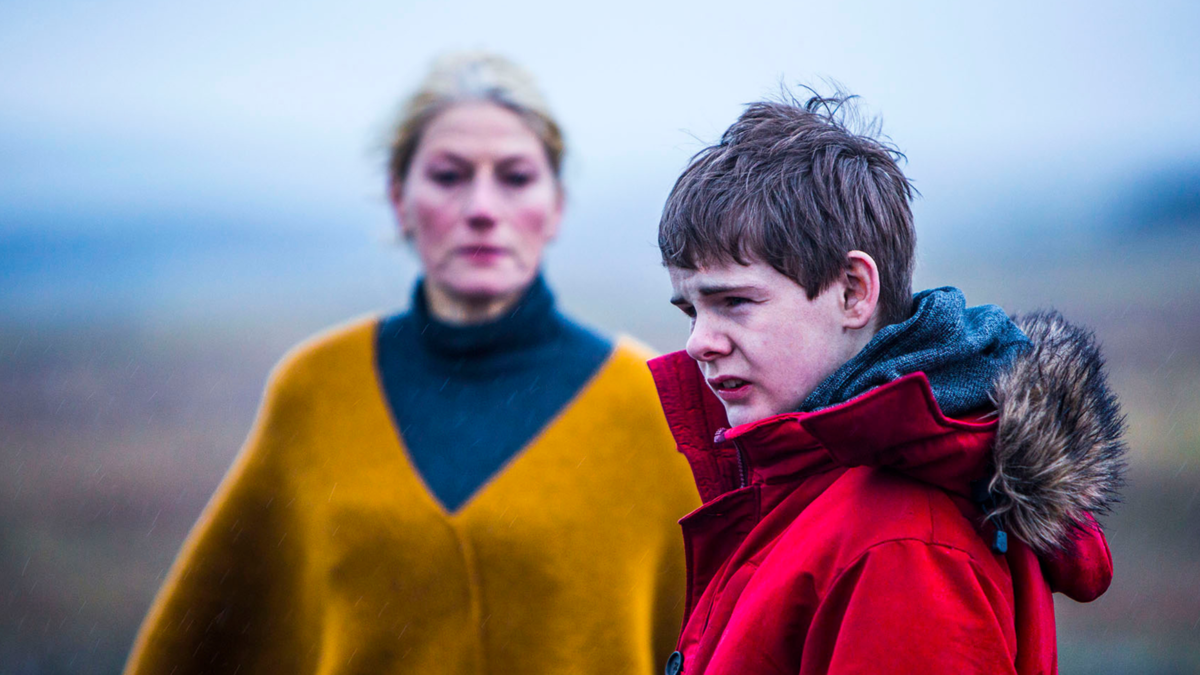
An American version was announced in 2014, but shelved a year later. Back in Blighty, Utopia was cancelled after two series, ending on a cliffhanger which left most of humanity at stake. Wilson Wilson, having switched sides, is poised to unleash Russian flu on the world.
Kelly tried to persuade Channel 4 that he could tie the show up with a two-hour special, to no avail. An American version did eventually make its way onto Prime Video a few years ago, but was cancelled after one series. It turned out that 2020 wasn’t the best year for a show about a pandemic.
Since Covid, conspiracy theories have flourished, and occasionally, Kelly gets contacted by the people who propagate them. He is quick to emphasise to them that his show is just a story.
“Back when I did Utopia, conspiracy thinking was so, so fringe,” Kelly explains. “I’m really glad I made it, [but] I don’t know if I could make it now because of the things people think you’re saying.”
“I had people emailing me saying ‘I just watched Utopia and it’s so prescient considering a current situation’, and I’d say ‘it’s not prescient’.”
“‘In Utopia, their pandemic is manufactured but ours isn’t.”
Changes to the world since 2014 haven’t all been bad.
“At the time, in the first series particularly, people used to get annoyed with me, because Jessica, as a woman, [was] being so manipulative,” O’Shaughnessy says.
Jessica is just as ruthless as the Network, with an added streak of emotional cunning. She’s equally comfortable turning friends against each other as she is with killing. She’s also a woman who’s happy to use her sexuality to get what she wants, something that often rubs audiences the wrong way. This is the same audience, though, that was largely fine with Arby, O’Shaughnessy points out, who in one scene guns down eight children.
“Someone like Jessica wouldn’t be so sidelined anymore,” O’Shaughnessy says. “It’s nice to see how we have developed in that regard.”
The DNA of Utopia has been allowed, cautiously, to spread into the shows being made today. De Veer is responsible for the distinctive theme tune for The White Lotus (show creator Mike White has said he wanted the feeling of “a tropical anxiety attack”). Sam Donovan adds “I’m still dining out on Utopia: I wouldn’t have got Severance [whose second series he will help direct] unless I’d done Utopia.”
Meanwhile, in the bar of the Soho Theatre, Paul Higgins is stuck in thought. He also appeared in The Thick of It – another show with a small but rabid following – so I’ve just risked a cliched question. What makes a cult classic?
Paul’s measured pause comes to an end, and he replies simply:
“They get a lot of good people together, and they try to do something different.”

